
Parvati, the Daughter of the Mountains
Along
the northern borders of India stand the snow clad peaks of the Himalayas.
Himavan was its king. His wife Mena gave birth to a beautiful daughter, Uma,
also known as Parvati, daughter of the mountains.
Parvati
was Sati reborn, the mother-goddess herself, determined to make Shiva a
householder once again.
Each
day, on her way back from her bath, she crossed the cold mountain valleys and
went into Shiva's cave with gifts of fruits and flowers. She would sweep the floor
and tend to the fire, hoping that he would take notice of her.
He
never did.
Most
of the time he meditated. Otherwise he smoked his pipe, the chilum, and lost
himself in narcotic dreams. Parvati knew that she wanted Shiva for a husband.
But how would she win his heart if he never even looked her way?
Kama shoots the Love Dart
The
gods decided to give Parvati a helping hand. Indra, king of the gods, sent for
Kama, god of desire. "Go, fill Shiva's heart with lust for Parvati. Force
him to give up his tapas; let him embrace the mountain princess instead."
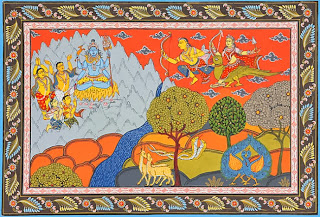 Accompanied
by the most ravishing apsaras, divine damsels, Kama went to Kailas. On his
arrival, spring breeze swept across the icy peaks, filling it with the fragrance
of love. The snow melted, and amidst the mountain streams appeared fragrant
bushes and flowers of every color. The stern wasteland became a pleasure
garden.
Accompanied
by the most ravishing apsaras, divine damsels, Kama went to Kailas. On his
arrival, spring breeze swept across the icy peaks, filling it with the fragrance
of love. The snow melted, and amidst the mountain streams appeared fragrant
bushes and flowers of every color. The stern wasteland became a pleasure
garden.
Parrots
whistled, bees buzzed, and mynahs sang songs of love as the nymphs danced in
delight. Inspired, Kama raised his sugarcane bow and let loose a love dart
capable of arousing passion in a thousand mortals. It ripped through Shiva's
heart.
The
apsaras clapped their hands and congratulated Kama. He had done what he had set
out to do. So they thought.
Shiva's
body that had forsaken desire once again felt a yearning for pleasure. But his
still mind had no intention of dancing to the tunes of the flesh. He decided to
quell the temptation, destroy its very source . . . cold-bloodedly, without
anger.
 Shiva
awakened his ajna chakra, the centre of intellectual discrimination, to destroy
desire. He turned his attention on Kama. The culprit had to be taught a lesson.
Shiva
awakened his ajna chakra, the centre of intellectual discrimination, to destroy
desire. He turned his attention on Kama. The culprit had to be taught a lesson.
Shiva
opened his third eye and let loose a fiery missile. It scorched Kama's
beautiful body until all that remained of the love-god was a heap of ash.
With
desire so brutally crushed, the cosmic sage returned to his meditation.
The Rise of Ananga
"What
have you done?" cried Rati, Kama's beloved apsara, "Without desire,
the bull will forsake the cow, the horse, the mare and the bees, the flowers.
There will be no homes, no families, for men and women will not love each
other. Society will collapse and life will be devoid of its very essence."
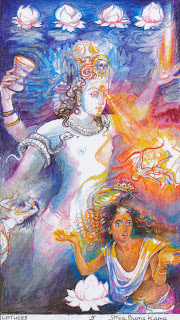 Rati
continued, "Desire may be the cause of suffering; but it is also the
reason behind joy. What is life without it? An existence without flavor. So
there is suffering. What is so terrible about that? After suffering, joy is
bound to return. Everything passes in nature, everything is impermanent,
including sorrow."
Rati
continued, "Desire may be the cause of suffering; but it is also the
reason behind joy. What is life without it? An existence without flavor. So
there is suffering. What is so terrible about that? After suffering, joy is
bound to return. Everything passes in nature, everything is impermanent,
including sorrow."
Rati's
lamentations moved Shiva. He also saw the wisdom in her words.
"I
destroyed Kama's body, but not his spirit. He will live on as Ananga, the
bodiless god, in everyone's heart," declared Shiva. He also revealed to
the world the secret of the discriminating eye — the tool with which to control
desire.
Shiva
realized that complete rejection of the world made little sense. Living had its
price suffering; it also had its reward joy. One came with the other. Together
they gave a reason for surviving.
Sati's
departure brought sorrow. But now there was Parvati her arrival held the
promise of joy. Perhaps he would marry the mountain princess, if her love for
him was true. With her he would find the balance between yoga and bhoga.
Parvati's Penance
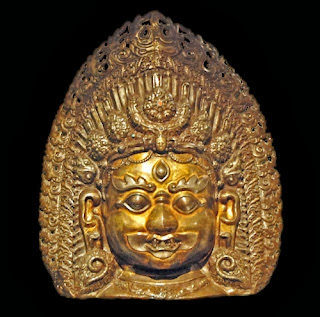 Parvati
realized that she had to prove the earnestness of her feelings if she wished to
be Shiva's consort.
Parvati
realized that she had to prove the earnestness of her feelings if she wished to
be Shiva's consort.
She focused
her mind on Shiva. She thought of nothing but him. She ate nothing, drank
nothing, she only chanted his name. She sat so still that ants began to crawl
on her skin and lizards slithered over her limbs, taking her to be a rock.
Sages were impressed by the determination of the mountain princess. They
gathered around her and blessed her. "She is Aparna,
the-girl-who-refuses-to-eat-even-a-leaf," they said.
Shiva
appeared before Parvati as a youth and said, "Shiva is a coarse barbarian
with rogues for friends. A beautiful girl like you needs a handsome man for her
husband, someone like me perhaps." Parvati ignored him and continued to
think about Shiva.
Shiva
then appeared disguised as an old man. "Dear child, stop craving for
Shiva. He is a yogi, a celibate ascetic, stern and boring. He will not make you
happy; he will ignore you for days on end. He is not worthy of you. Marry
someone clever like Vishnu or strong as Indra." Parvati ignored him and
continued to think about Shiva.
Shiva
then came in the form of a deformed dwarf. "If Shiva is good enough for
you, you obviously aren't very choosy. Why don't you marry me instead? I won't
be as demanding as Shiva; I will be at your beck and call." Parvati
ignored him and continued to think about Shiva.
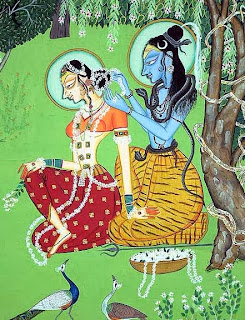 Parvati's
persistence was amazing. Shiva was impressed. He agreed to marry her.
Parvati's
persistence was amazing. Shiva was impressed. He agreed to marry her.
"By
traditional rites!" demanded the gods. Shiva agreed.
Shiva begs for Parvati's Hand
A
beggar, accompanied by a dog, appeared in front of Himavan's palace with a
rattle drum in hand. He began to dance to the rhythm of the drum. He danced so
beautifully that the king and queen of the mountains were impressed. Everybody
was. They had never seen anything like it.
They
offered the beggar clothes and food. He refused them all. They offered him
jewels but he refused that too.
"What
do you seek?" asked the king. "Ask and it shall be yours."
"I
want your daughter Parvati," said the beggar.
"What!"
 "Yes,
your daughter. You must let her marry Shiva, the great yogi."
"Yes,
your daughter. You must let her marry Shiva, the great yogi."
Before
Himavan could voice his protest, the beggar disappeared. He was none other than
Shiva as
Bhikshatan,
the supreme mendicant. In keeping with tradition he had asked for his bride's
hand in marriage.
"We
will take the marriage invitation to the groom," said Vishnu, Brahma and
the seven cosmic sages, the sapta rishis smothering Himavan's protests. Before
he could stop them, they were on their way to Kailas.
The Marriage Party
It
was to be the grandest wedding of the era. Himavan spared no effort or expense
to make the wedding ceremony a success.
Sacred
diagrams were placed on the floor and the walls. Priests chanted the prayers
according to the guidelines in sacred texts, the Grihasutras. Every traditional
rite was observed in minute detail.
 Parvati
was anointed with fragrant oils and bathed in perfumed water. Auspicious marks
were placed on her body and she was bedecked with love charms. She looked
beautiful, a beaming bride, happy at the thought of marrying the man she
wanted.
Parvati
was anointed with fragrant oils and bathed in perfumed water. Auspicious marks
were placed on her body and she was bedecked with love charms. She looked
beautiful, a beaming bride, happy at the thought of marrying the man she
wanted.
News
came that the groom's party had reached the royal hill and was on its way up to
the palace. Parvati's mother,
Mena
and her handmaids stood at the gates with garlands and incense to welcome the
groom. There was excitement all around. Nobody had ever seen Shiva. They all
wondered what he looked like.
He
was hideous.
Matted
hair, ash smeared face, snakes around his neck and for clothes, a strip of
elephant hide across his loins: Shiva looked positively repulsive. He carried a
trident in one hand, a drum in another and rode a bull. He seemed to be in a
state of inebriation.
Around
him were his friends, the ganas, a bunch of foulmouthed hooligans. They were
beating drums and blowing trumpets, creating a terrible cacophony of sounds.
The groom's party seemed to comprise of the most deadly, bloodthirsty, fiendish
creatures imaginable: all the gypsies, gnomes, genii, ghosts and goblins that
haunted hill slopes and crossroads. The procession was led by witches and
vampires, sorcerors and conjurers, phantoms and spirits.
 Like
Shiva, all the ganas were drinking bhang and becoming more unruly by the
minute. They screamed and shrieked, danced and jumped about the place.
"Glory to Shiva, glory to Shiva," they shouted throwing, instead of
flowers, skulls, bones and the most venomous reptiles imaginable.
Like
Shiva, all the ganas were drinking bhang and becoming more unruly by the
minute. They screamed and shrieked, danced and jumped about the place.
"Glory to Shiva, glory to Shiva," they shouted throwing, instead of
flowers, skulls, bones and the most venomous reptiles imaginable.
The
sh6ck was too much to bear. Mena fainted.
The Marriage called off
"Who
is this freak?" asked Himavan. "He is Shiva," said Vishnu.
"That can't be him. He looks like a demon."
"I
assure you he is the greatest of gods, Maheshvar, himself."
"He
may be a great god, but he will not marry my daughter. I will not let
him."
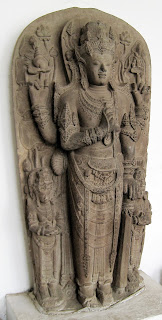 Mena
supported her husband completely. "Lock the palace gates. Keep that man
and his rowdy companions out," she told the guards. "No mother in her
right mind will give her dear child to such a madman."
Mena
supported her husband completely. "Lock the palace gates. Keep that man
and his rowdy companions out," she told the guards. "No mother in her
right mind will give her dear child to such a madman."
Parvati
was shocked by her parent's decision. They promised to find her a better groom.
"No,
I want only Shiva."
Mena
couldn't believe her ears: "I think that yogi, that sorceror, has cast a
spell on our child. 0 how terrible!"
She
began to cry. Parvati cried too as did the other women of the palace.
The
marriage had been called off.
Shiva transforms himself
Parvati
prayed to Shiva. "For me lord, for me, show them what they want to see,
not what you really are."
Shiva
heard her prayers. Society was not interested in the bitter truth; it preferred
being entertained with sweet illusions. So be it.
 The
palace gates flung open and the groom entered Himavan's palace. Bathed in
mountain springs, wearing a garland of fragrant flowers, he was the most
handsome man anyone had ever seen: fair skin, dark eyes, long silky hair, broad
shoulders, narrow hips, lithe limbs. . . he was the personification of beauty,
Sundaramurti.
The
palace gates flung open and the groom entered Himavan's palace. Bathed in
mountain springs, wearing a garland of fragrant flowers, he was the most
handsome man anyone had ever seen: fair skin, dark eyes, long silky hair, broad
shoulders, narrow hips, lithe limbs. . . he was the personification of beauty,
Sundaramurti.
"I
have come for my bride," Shiva announced standing before Himavan.
"Where is she?"
Mena
couldn't believe her eyes. "Is it the same man who sat on the bull outside
the palace gates?"
"The
same," assured Vishnu.
"And
who are those handsome boys and girls standing behind him?"
"They
are the ganas, the groom's party."
"Oh.
. . But. . . then who? . . . "
"The
auspicious hour for the union may pass as we seek answers." Vishnu urged
the queen and king of the Himalayas to get on with the proceedings.
Fine
tunes of love and desire filled the air as priests chanted the hymns of union.
Then before the holy fire Shiva held Parvati's hand and took the vows that made
them husband and wife.
With
that Shiva and Parvati became two halves of the whole.
The
cosmos rejoiced.
Writer Name: Devdutt Pattanaik
Read Also:

 Accompanied
by the most ravishing apsaras, divine damsels, Kama went to Kailas. On his
arrival, spring breeze swept across the icy peaks, filling it with the fragrance
of love. The snow melted, and amidst the mountain streams appeared fragrant
bushes and flowers of every color. The stern wasteland became a pleasure
garden.
Accompanied
by the most ravishing apsaras, divine damsels, Kama went to Kailas. On his
arrival, spring breeze swept across the icy peaks, filling it with the fragrance
of love. The snow melted, and amidst the mountain streams appeared fragrant
bushes and flowers of every color. The stern wasteland became a pleasure
garden.  Shiva
awakened his ajna chakra, the centre of intellectual discrimination, to destroy
desire. He turned his attention on Kama. The culprit had to be taught a lesson.
Shiva
awakened his ajna chakra, the centre of intellectual discrimination, to destroy
desire. He turned his attention on Kama. The culprit had to be taught a lesson.
 Rati
continued, "Desire may be the cause of suffering; but it is also the
reason behind joy. What is life without it? An existence without flavor. So
there is suffering. What is so terrible about that? After suffering, joy is
bound to return. Everything passes in nature, everything is impermanent,
including sorrow."
Rati
continued, "Desire may be the cause of suffering; but it is also the
reason behind joy. What is life without it? An existence without flavor. So
there is suffering. What is so terrible about that? After suffering, joy is
bound to return. Everything passes in nature, everything is impermanent,
including sorrow."  Parvati
realized that she had to prove the earnestness of her feelings if she wished to
be Shiva's consort.
Parvati
realized that she had to prove the earnestness of her feelings if she wished to
be Shiva's consort.  Parvati
was anointed with fragrant oils and bathed in perfumed water. Auspicious marks
were placed on her body and she was bedecked with love charms. She looked
beautiful, a beaming bride, happy at the thought of marrying the man she
wanted.
Parvati
was anointed with fragrant oils and bathed in perfumed water. Auspicious marks
were placed on her body and she was bedecked with love charms. She looked
beautiful, a beaming bride, happy at the thought of marrying the man she
wanted.  Like
Shiva, all the ganas were drinking bhang and becoming more unruly by the
minute. They screamed and shrieked, danced and jumped about the place.
"Glory to Shiva, glory to Shiva," they shouted throwing, instead of
flowers, skulls, bones and the most venomous reptiles imaginable.
Like
Shiva, all the ganas were drinking bhang and becoming more unruly by the
minute. They screamed and shrieked, danced and jumped about the place.
"Glory to Shiva, glory to Shiva," they shouted throwing, instead of
flowers, skulls, bones and the most venomous reptiles imaginable.  Mena
supported her husband completely. "Lock the palace gates. Keep that man
and his rowdy companions out," she told the guards. "No mother in her
right mind will give her dear child to such a madman."
Mena
supported her husband completely. "Lock the palace gates. Keep that man
and his rowdy companions out," she told the guards. "No mother in her
right mind will give her dear child to such a madman."  The
palace gates flung open and the groom entered Himavan's palace. Bathed in
mountain springs, wearing a garland of fragrant flowers, he was the most
handsome man anyone had ever seen: fair skin, dark eyes, long silky hair, broad
shoulders, narrow hips, lithe limbs. . . he was the personification of beauty,
Sundaramurti.
The
palace gates flung open and the groom entered Himavan's palace. Bathed in
mountain springs, wearing a garland of fragrant flowers, he was the most
handsome man anyone had ever seen: fair skin, dark eyes, long silky hair, broad
shoulders, narrow hips, lithe limbs. . . he was the personification of beauty,
Sundaramurti. 












0 Response to "Short Not on Marriage of Shiva"
Post a Comment